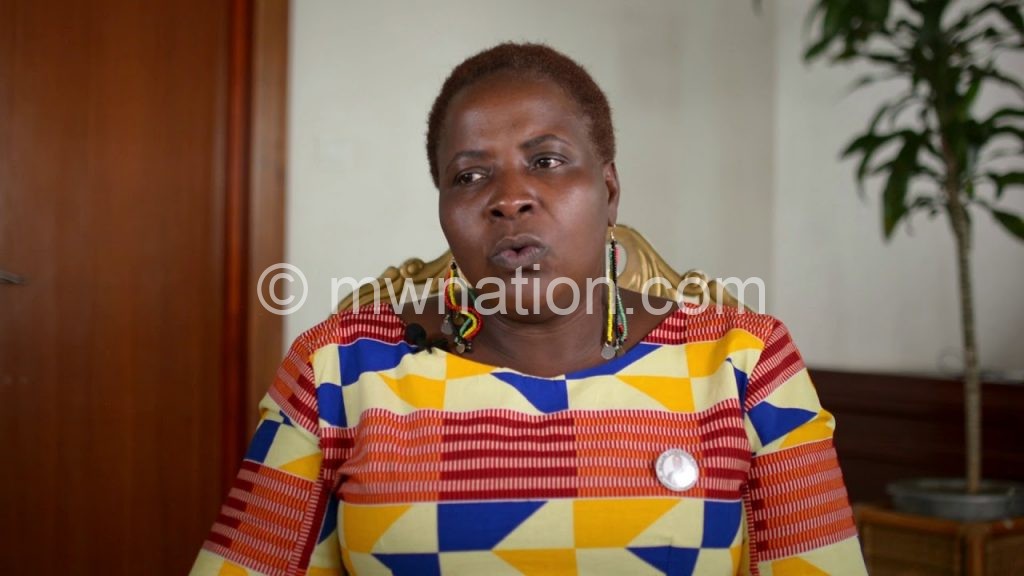Govt makes face masks mandatory
Wearing a face mask is no longer optional. In an effort to fight and contain the Covid-19 global pandemic, government has made wearing of a face mask in public places mandatory through a subsidiary legislation issued on Friday.
Following the gazetting of the Coronavirus legislation, signed and issued by Health Minister Khumbize Kandodo Chiponda, failure by any person to wear a face mask in public is an offence that attracts a K10 000 fine upon conviction.

Government, through the same Coronavirus laws, has also banned public gatherings of more than 10 people, except a funeral (restricted to 50 people only), a meeting of the National Assembly and a meeting convened to discuss Covid-19 interventions.
The law limiting public gatherings to 10 people also extends to religious gatherings, with Attorney General (AG) Chikosa Silungwe confirming in a telephone interview yesterday that churches would be in breach of the law if more than 10 people gather.
“The law stipulates that not more than 10 people gather, so yes, if churches bring together more than 10 people, they will be in breach of this law,” the AG warned.
Asked what government has done to sensitise the public to the new law, especially on the face masks and public gatherings, Silungwe said the Minister of Health is planning to address a news conference, which, he said, he will be part of as government chief legal adviser.
In a separate interview yesterday, Minister of Health Chiponda appealed to the public to understand the situation and help government fight the pandemic, adding she was aware that the public gatherings affected by the new legislation include church meetings, weddings and traditional engagements.
She said although she is aware that once legislation is gazetted it immediately becomes law and enforceable as per advice she received from the AG, she has organised a news conference at Bingu International Conference Centre (BICC) today at 10am in Lilongwe, to be attended by the AG, Minister of Justice and Constitutional Affairs [Titus Mvalo], among other officials.
The officials, she said, are expected to talk more about the new laws as part of public awareness.
Said the minister: “Let’s accept it, we have a serious problem amidst us. People are being infected, people are dying and there’s no cure so far. We’re not trying to punish Malawians, but we are doing all this to save lives.
“All we are doing is trying to avoid further transmission. We have worse cases in Blantyre and Lilongwe; other districts are affected as well. We know there are some people who cannot afford face masks, we’ve appealed to the private sector to intervene.”
Chiponda said an appeal also goes to all the political parties to come in and help, arguing if they are able to buy party cloth for distribution to their membership, they should be able to organise washable face masks for free distribution.
The minister said a lockdown for Malawi at this point was not appropriate, but felt they needed to do something to protect Malawians.
On funeral attendance of a person who has died of any other cause and not Covid-19-related cases, the new legislation stipulates that such a funeral be attended by not more than 50 people.
Previously, government guidelines on public gatherings allowed 100 people to attend non-Covid-19-related funerals.
Reads in part the subsidiary legislation: “Public gatherings are hereby prohibited, subject to exceptions provided in this Rule [a funeral, meeting of the National Assembly and meetings on Covid-19 interventions].”
On public gatherings, the law stipulates that a person who contravenes this rule commits an offence and shall, on conviction, be liable to not only a fine of K100 000, but also be sent to jail to serve a three-month prison term.
Under the Public Health Act, the new legislation is known as Public Health (Coronavirus and Covid-19) (Prevention, Containment and Management) Rules, 2020.
Enforcement officers of the new law include a member of the Malawi Defence Force, a police officer, an immigration officer, a prison warder, a health officer, a forestry officer, a local government officer and a national parks and wildlife officer.
The new laws also require that burial ceremony of a person who died of Covid-19 be attended by not more than 10 people, and should be buried within the shortest time possible, not later than 24 hours.
“Ensure that the dead body is handled and buried by a designated burial team in the community which shall at the time of handling the body, wear personal protective equipment,” it reads.
The laws empower enforcement officers to force treatment and sequestration or disinfection or both of the baggage and personal effects of a person suspected of being infected with or recently exposed to Covid-19.
The new laws seek to punish Covid-19 positive people who move out of quarantine or any place of confinement and go about places and also in-charges of public events such as weddings or owners of venues where public events take place or occupants, if they are more than 10, found at such places that they would be liable to outlined punishments.
There is currently a matter in court after some concerned citizens, including bottle store owners and Human Rights Defenders Coalition (HRDC), obtained an injunction against the ousted Democratic Progressive Party (DPP) administration’s planned lockdown.
The new AG, Silungwe, in a letter dated July 13 2020 addressed to co-chairperson of the Presidential Task Force on Covid-19 Dr John Phuka, advised him not to implement the newly-issued Covid-19 restrictions as there was a legitimate injunction still in place.
The restrictions included a ban on meetings, street markets, weddings, restrictions on bars and other entertainment places, capacity in passenger vehicles and adherence to all Covid-19 measures in religious gatherings and funerals.





